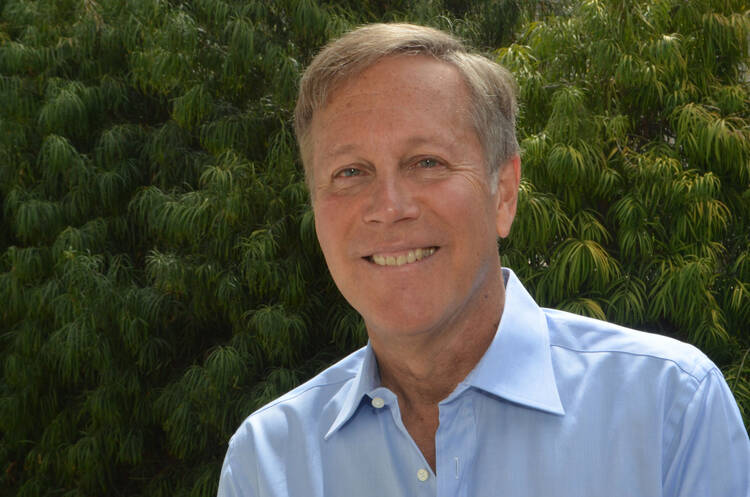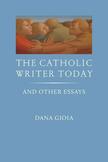Review: Is there still such a thing as a Catholic writer?
Few writers craft arguments so forceful and sweeping that, upon publication, they not only reenergize but utterly reframe the debate; even fewer publish such an argument not once but twice in a single career; and yet fewer do so and somehow find time along the way to rescue and revivify two American icons—namely, the National Endowment for the Arts and Jell-O brand gelatin.
Actually, there is only one person who has done that, and his name is Dana Gioia. Poet, critic, professor, advocate and, yes, for a memorable stretch, the General Foods marketing executive tasked with stemming Jell-O’s decline, Gioia has lived an extraordinary life. Author of five poetry collections, three opera libretti and numerous translations, he has now published his fourth book of criticism, The Catholic Writer Today and Other Essays. It is a remarkable book.
Although it is a book of prose, as I worked my way through it, I kept thinking of a line of his poetry, specifically the fourth line of his poem of reworked beatitudes, “A Prayer of Winter Solstice”: “Blessed is the labor that exhausts us without end.” Not that Gioia, now 68, shows the least sign of exhaustion—indeed, it is entirely possible he is just getting started.
Gioia grew up in Hawthorne, Calif., not far from Los Angeles International Airport. His father was Italian-American, and his mother, as he explains in one of two long-form interviews collected in this book, “was a working-class Mexican American woman born in poverty.” She loved poetry, memorized favorites and shared this gift with her son. Lest any of this sound unusual, Gioia reminds the interviewer that “[d]espite what the professors would have us believe, average Americans once loved poetry.”
Poet, critic, professor, advocate and, yes, for a memorable stretch, the General Foods marketing executive tasked with stemming Jell-O’s decline, Dana Gioia has lived an extraordinary life.
By 1991, though, in Gioia’s estimation, that love had long faded. That was the year Gioia published his second poetry collection, The Gods of Winter, and the year The Atlantic published his provocative essay, “Can Poetry Matter?” As Gioia himself said in the essay, “Arguments about the decline of poetry's cultural importance are not new.” But Gioia’s nearly 8,000-word jeremiad—which lay the blame at least partially at the feet of academics—offered something that was new or at least felt new to a new generation of writers and readers: hope. Gioia called for getting poetry out into the community, for integrating performances with other arts, and for not ignoring the popular, or as he more memorably put it:
It is time to experiment, time to leave the well-ordered but stuffy classroom, time to restore a vulgar vitality to poetry and unleash the energy now trapped in the subculture. There is nothing to lose. Society has already told us that poetry is dead. Let’s build a funeral pyre out of the desiccated conventions piled around us and watch the ancient, spangle-feathered, unkillable phoenix rise from the ashes.
Nearly 30 years on, that essay is still remembered—and poetry is, if not ascendant, arguably more central to American life and letters than it has been for decades. To be clear, that is not all Gioia’s doing, but few writers can claim to have had as direct and broad an impact, financially and otherwise, on American arts as Gioia has. Serving as N.E.A. chair for six years under President George W. Bush, Gioia became known—at least in the opinion of a Bloomberg News headline writer—as the “man who saved the NEA” from its years-long battle against defunding. Surely his staff and predecessors are due some of that credit, but very much to Gioia’s credit were programs such as those that brought Shakespeare plays to every state and writing workshops for service members to military bases worldwide.
When Gioia stepped down, he hinted at his future plans, telling The Washington Post in 2008, “There’s a role for the poet and public intellectual in society.”
But by 2012, those plans had taken a turn. Speaking to an interviewer from Image in an interview collected here, Gioia noted that “Now that I am a private citizen again, I can speak from a personal point of view,” and he did, bluntly. The next year, Gioia published in First Things the fiery title essay of this book. The tone is still as earnest and emphatic as it was in “Can Poetry Matter?” but has become altogether more urgent, perhaps because the subject matters to him more deeply. He opens by identifying a “cultural and social paradox that diminishes the vitality and diversity of the American arts”:
... Stated simply, the paradox is that, although Roman Catholicism constitutes the largest religious and cultural group in the United States, Catholicism currently enjoys almost no positive presence in the American fine arts—not in literature, music, sculpture, or painting. This situation not only represents a demographic paradox. It also marks a major historical change—an impoverishment, indeed even a disfigurement—for Catholicism, which has for two millennia played a hugely formative and inspirational role in the arts.
Dana Gioia: "It is time to experiment, time to leave the well-ordered but stuffy classroom, time to restore a vulgar vitality to poetry and unleash the energy now trapped in the subculture."
Stated simply, this book should come with a seatbelt. Not because the ride ahead is bumpy—Gioia is as gifted a writer of prose as he is poetry—but because the velocity of its thinking is so great and the range of references so vast. In addition to the title piece, there are beautiful, searching essays on Donne, Hopkins and lesser (but should be better) known poets like Dunstan Thompson, William Everson (a.k.a. Brother Antoninus) and Elizabeth Jennings. There is an authoritative journey through Paul’s Epistle to the Philippians and thoughtful discussions of art, including the painter George Tooker (a detail of his painting “Embrace of Peace II” appears on the book’s cover). Dozens of other writers, artists and musicians glimmer in these pages, too, ranging from Dave Brubeck to Morten Lauridsen.
Gioia does not demand or even expect agreement with all his assessments. (And I didn’t always agree, as when, say, he deplores “folksy anthems composed by amateur Jesuit musicians. If hell has a hymnal, these tunes will fill its opening pages.” Well, here I am, Lord.) But he does command attention. Six years later, “The Catholic Writer Today” reads with as much energy as it did upon its original publication, if not more, and it throws down a gauntlet every bit as challenging as “Can Poetry Matter?” though the audience may be smaller.
Indeed, that is part of his central lament—the ranks of nationally-known Catholic writers are smaller and smaller still than in the glory days, which Gioia charts as lasting from roughly 1945 to 1965. During this stretch, “Catholic novelists and poets received 11 Pulitzer Prizes and 5 National Book Awards.” But perhaps more significantly, they published widely in publications both Catholic and secular. They gave talks. Moreover, they were talked about—and talked about as Catholics. Gioia succinctly defines the era this way:
First, many important writers publicly identified themselves as faithful Catholics. Second, the cultural establishment accepted Catholicism as a possible and permissible artistic identity. Third, there was a dynamic and vital Catholic literary and intellectual tradition visibly at work in the culture. Fourth and finally, there was a critical and academic milieu that actively read, discussed, and supported the best Catholic writing.
Unlike many other critics who rage against a problem and then hardly rise from their armchairs but to fan the flames of the ensuing argument, Dana Gioia rolls up his sleeves and gets to work.
“Today,” he concludes, “not one of those four observations remains true.” Though “today” refers to 2013, when the essay was first published, the line goes unrevised in the 2019 book, so it is fair to assume that Gioia still believes this. But is it still true?
Yes—but also, increasingly, no. And this is due, in part, to Gioia himself, who has been working diligently to undermine his own assertion. He has moved well past lamenting the plight of the Catholic writer today to working adamantly to foster the careers of the Catholic writers—and readers—of tomorrow.
In short, unlike many other critics who rage against a problem and then hardly rise from their armchairs but to fan the flames of the ensuing argument, Gioia rolls up his sleeves and gets to work. In this, he is very much following the pattern of that first clarion call: “Can Poetry Matter?” Yes, was Gioia’s answer, and he then worked diligently to make poetry matter, publishing poems, publishing criticism and pioneering poetry programs at the N.E.A., like the Poetry Out Loud competition, that were entirely designed to broaden and democratize poetry’s audience. In his subsequent role as poet laureate of California, he visited every county in the state, bringing poetry (and not only his own) to people who might never have encountered it before.
Why aren’t more voices of the incredibly vibrant and diverse new generations of writers—many of them cradle Catholics—willing to claim their Catholic identities?
So, too, did he take up the cause of American Catholic literature. In 2015, working with Jim Heft, S.M., a Marianist priest at the University of Southern California, and many others, Gioia spearheaded the “Future of the Catholic Literary Imagination” conference, attracting some 200 writers and artists and thinkers to Los Angeles to talk and share and argue. It has since become a biennial event; the most recent iteration, at Loyola University Chicago, drew more than 500 for a lively weekend. Many well-known Catholic writers were on hand, including Alice McDermott and Tobias Wolff, but a new generation, too, including important, prize-winning voices like Kirstin Valdez Quade and Phil Klay, along with even newer (and younger) voices, like Julia Walsh, F.S.P.A., and the publishers behind Wiseblood Books, which has launched a slew of fiction, poetry and critical titles, including this one. And there are other signs of life. Commonweal just published an 80-page books issue. Americanow has a Catholic Book Club. Catholic writing in the United States may not currently equal its halcyon postwar days, but it is more dynamic and diverse than it’s been in years.
Can poetry matter? Yes. Can the Catholic writer today matter? Of course. But it is instructive that Gioia’s essay and book title does not ask the latter question. That is for readers and writers—and the church—to do, and to ask other questions besides. What would it take for Catholic writers today to matter even more and to whom? What (if anything) about being Catholic affects what we write and what we read? Why aren’t more voices of the incredibly vibrant and diverse new generations of writers—many of them cradle Catholics—willing to claim their Catholic identities?
These are hard questions. The answers are not simple, and neither is Gioia’s argument. But one part of it is simple, and it emerged during a general session at that most recent Catholic imagination conference in Chicago, when Gioia mentioned that whenever he does a reading now, whatever the setting, he is always sure to do one thing: He tells the audience he is Catholic.
That matters.
This article also appeared in print, under the headline “Dana Gioia requests your attention,” in the January 6, 2020, issue.











